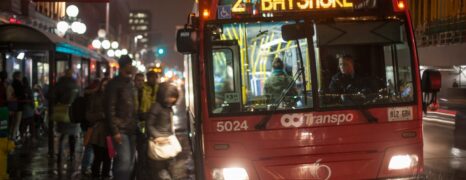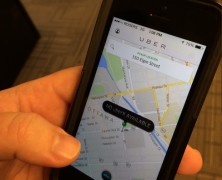By Evelyn Harford OC Transpo has the highest single-ride adult fare in Canada. As fares rise in the city of Ottawa, OC Transpo has had very limited discounts for homeless and low-income people for the last two years. Catherine McKenney, councillor-elect for Somerset ward, wants to change that. “The one thing I will be looking at around transit is the reinstatement of the community bus pass for low-income residents,” said McKenney. “I think it’s important. I think it disproportionately affects our most vulnerable residents.” Right now the only homeless or low-income people who qualify for a break on transit fares are those who have a physical or intellectual disability. A review of the OC Transpo annual reports from 2009-2012 and a City of Ottawa report on poverty in 2010 shows that approximately 60,000 OC Transpo riders are below the low-income cut-off. During the recent municipal election in Ottawa some candidates heard demands for lower fares. “When I was out campaigning I visited different shelters,” said McKenney. “It is the number one issue I heard from folks. They have no options to get anywhere in the city without a community bus pass.” OC Transpo first introduced a community pass in 2006. David Chernushenko, city councillor for Capital ward said at some point between 2011-2012 the eligibility requirements for the community pass changed. The pass would no longer be available for people based on their income status alone. The discounted OC Transpo monthly community pass, currently costs $40.75 compared to $100.75 for the regular adult monthly pass. The city budget will be tabled in January, 2015 and Chernushenko expects this issue will be raised during the budget deliberations. “I do feel the city can and should look to find simpler to ways for people of a demonstrably lower income to get passes or tickets at a lower fare.” But Chernushenko said it won’t be easy given the budget cuts from the province. “It is a challenge. It represents new money. It represents the city finding money to offer those passes at a discounted rate that we haven’t currently budgeted for. So that does mean a tax increase or money taken from somewhere else,” said Chernushenko. “It’s bad,” said Rafael Custas, referring to the regular $100.75 adult monthly pass. “I just cannot buy it.” Custas arrived from Honduras six months ago and has been able to hold a part-time job. However, the high cost of transit has made it difficult for him to work full-time hours. Although a federal tax credit of 15 per cent is offered to those purchasing monthly passes, Custas say that this is not enough. Homeless and low-income individuals rely on the Ottawa Mission’s free bus tickets. These are for people who can prove that they have an appointment with social services, which is not within walking distance of the city centre. “While the cost of public transportation is a significant challenge for municipalities, it is critical to seek ways to make public transit more affordable for low income residents as an important strategy to improve their situation,” said the most recent City of Ottawa report on poverty. OC Transpo has not yet provided an official response on this matter. John O’Hara, a regular at St. Joseph’s Parish for the free meals offered daily, said that if people can’t afford groceries, they can’t afford a monthly pass at the regular fare. “They’re just not giving us enough money to live on,” O’Hara said, “Give me a community pass.” |Create...
A consumer’s right to choose: Uber versus taxis...
By Hayley Chazan Click on the tags to find out more about how Uber works. If you’ve ever been stuck waiting for a cab, you know just how frustrating the taxi system can be. The problem is often worse on weekends and holidays. On New Year’s Eve, it is nearly impossible to hail down a cab, let alone reach the taxi company by phone. Blueline Taxi, Ottawa’s leading cab company, accounts for 80% of the taxi market in the city, meaning limited competition and few choices for consumers. On Oct.1, all of this changed with the appearance in Ottawa of the controversial, and quite possibly illegal, ridesharing service Uber, which has spread rapidly through the United States and Europe as well as Canada. Uber brands itself as a technological company with its business model relying on smartphone apps. It presents consumers with an alternative to taxis and operates as a low-cost ridesharing service. Its low cost is its most attractive feature, according to Ottawa resident Delaney Hoeppner. “Taking a taxi from my apartment downtown to the airport normally costs close to $50. With Uber, depending on the traffic, the fare can often be as low as $30,” she said. Uber has gained a large following on Twitter, with many users actively supporting the ridesharing service. John Baird, the Minister of Foreign Affairs, tweeted about Uber, expressing his frustration about an old-fashioned cab that never arrived. He said there is a need for greater competition in the industry. But Uber attracts criticism, even hostility, everywhere it goes. One concern is that Uber drivers are not licensed. Anyone can sign up to work for Uber if they have a car that is less than 10 years old and can pass a criminal record check. The licensing...


